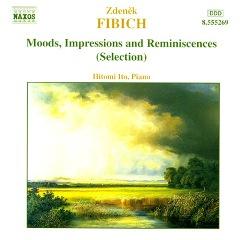Fibich - Moods Impressions and Reminiscences (2000)
Fibich - Moods Impressions and Reminiscences (2000)

01] Moods Impressions And Reminiscences Op 41 Book 4 No 14 Poem 02] Moods Impressions And Reminiscences Op 41 Book 3 No 20 Andantino In B Flat Minor 03] Moods Impressions And Reminiscences Op 47 Book 1 No 17 Andantino In F Major 04] Moods Impressions And Reminiscences Op 41 Book 1 No 14 Molto Agitato In D Minor 05] Moods Impressions And Reminiscences Op 41 Book 4 No 26 Molto Moderato Ed Espressivo In D 06] Moods Impressions And Reminiscences Op 47 Book 5 No 79 Allegro In D Minor 07] No 38 Lento In G Minor 08] No 39 Lento Con Extrema Espressione In G Major 09] Moods Impressions And Reminiscences Op 47 Book 1 No 23 Appassionato In E Minor 10] No 17 Lento In B Major 11] No 19 Quasi Presto E Con Fuoco In E Minor 12] No 3 Lento Assai In A Minor 13] No 20 Con Moto In C Major 14] No 33 Agitato In C Minor 15] Moods Impressions And Reminiscences Op 41 Book 1 No 8 Adagio In E Flat Major 16] Moods Impressions And Reminiscences Op 41 Book 4 No 36 Andantino In B Flat Major 17] Moods Impressions And Reminiscences Op44 Book 2 No 12 Andantino In B Flat Minor 18] Moods Impressions And Reminiscences Op 47 Book 1 No 36 Andante Amoroso In B Flat Major 19] Moods Impressions And Reminiscences Op 41 Book 2 No 41 Allegretto Agitato In G Minor 20] Moods Impressions And Reminiscences Op 47 Book 10 No 145 Tempo Di Polacca In D Major 21] Moods Impressions And Reminiscences Op 41 Book 1 No 24 Lento In G Minor 22] Moods Impressions And Reminiscences Op 44 Book 4 No 27 Andante Con Moto In B Flat Major 23] Moods Impressions And Reminiscences Op 47 Book 6 No 93 Con Moto In B Flat Minor 24] No 6 Adagio In A Flat Major 25] No 10 Con Sentimento In F Minor 26] Moods Impressions And Reminiscences Op 41 Book 3 No 9 Allegro Zefiroso E Leggiero In A F~1 27] Moods Impressions And Reminiscences Op 57 Book 2 No 16 Allegro Con Fuoco In D Minor 28] Moods Impressions And Reminiscences Op 47 Book 10 No 146 Andante In B Flat Minor 29] Moods Impressions And Reminiscences Op 47 Book 4 No 64 Moderato In E Minor 30] Moods Impressions And Reminiscences Op 57 Book 1 No 6 Moderato In E Minor Hitomi Ito – piano
Fibich was the third of the leading Czech composers of the last half of the nineteenth century, after Smetana and Dvorák. His music is strongly Romantic and often intensely personal. Less nationalistic than was fashionable for much of his later life and early posterity, his works have only recently begun to meet a revival of interest.
Fibich's mother was from a cultured Viennese family, while his father was a Czech forestry official. He was born in a remote rural town and later moved to another, Liban. All his life he retained a love of nature. Fibich was home-schooled by his mother until he was nine; she also taught him piano, and then referred him to a local priest, Frantisek Cerny, for studies in music theory. He later attended a private music school in Prague; by the end of his schooling, Fibich had written over 50 compositions. Most were piano pieces and songs, but some were more ambitious, including an attempt at music for the final part of Romeo and Juliet and a symphony sketched out on four open staves. In 1865 he entered the Leipzig Conservatory, studying with Ignaz Moscheles and others. He returned to Bohemia in 1870, lived with his parents a year until he had turned 21, and then moved to Prague.
He began composing full-time, writing an opera, Bukovin, to a libretto by the same writer responsible for Smetana's The Bartered Bride. In 1873 he married Ruzena Hanusova and took a position directing a choir in Vilnius, Lithuania. His tone poem of that year, Zaboj, Slavoj, and Ludek, deeply influenced Smetana's nascent Má Vlast. Soon the newlyweds were expecting twins, but Fibich suffered the loss of his wife, her sister, and both babies over the next two years.
Fibich took a job at the Provisional Theater in Prague, and married a third Hanusova sister, Betty, in 1875. They had a son, Richard, in 1876. This baby survived, but the marriage did not. Finding that his theatrical duties took him away from composition, Fibich gave them up in favor of a position at the Russian Orthodox Church in Prague in 1878. He wrote a fairly successful opera, Blanik, and became interested in the unusual musical form of the melodrama. He came to be one of the most successful composers in that genre.
In 1881 Fibich resigned from his church position and devoted himself full-time to composing and teaching. Soon he fell in love with a pupil, a singer named Anezka Schulzová, and eventually abandoned his wife and son for her. Miss Schulzova was a well-read young woman who directed Fibich toward texts with a feminist orientation. Indeed, of his last four operas, she wrote the texts for three of them. Sarka (1897), about a Czech female military leader, was his most successful work, in part due to its patriotic theme.
Fibich also began writing an immense series of short piano works called Moods, Impressions, and Reminiscences, composed between 1891 and 1899. They form virtually a musical diary of his affair with Schulzova, and often they are exceptionally intimate and passionate. In 1899 he returned to a position as producer at the Provisional Theater, now called the National Theater. He died unexpectedly of a kidney infection in 1900. ---Joseph Stevenson
download: uploaded anonfiles mega 4shared mixturecloud yandex mediafire ziddu








